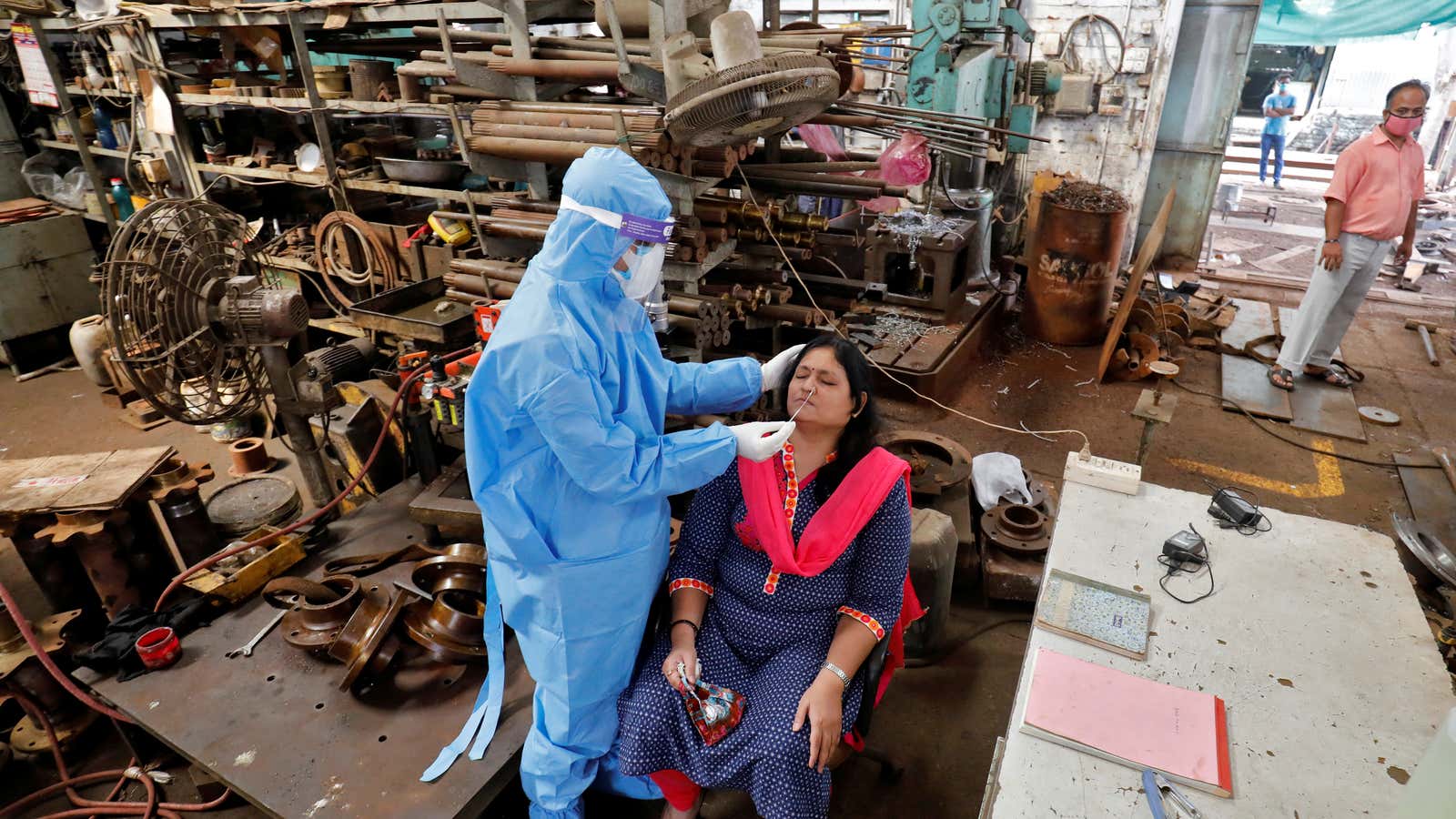The first confirmed case of Covid-19 reinfection was reported by researchers at the University of Hong Kong in the last week of August. A few other anecdotal cases of reinfection have since emerged, including one from Bengaluru.
How exactly is a case of reinfection confirmed? What are the chances of being infected again after making a full recovery from Covid-19? What does it mean for long term immune response to the SARS CoV2 virus which is at the centre of the current outbreak?
Scroll.in spoke to Dr Shahid Jameel, a virologist who is the director of the Trivedi School of Biosciences at Ashoka University.
Does testing positive for a second time, weeks or months following a first infection and having seemingly recovered from it, necessarily mean the person has been reinfected?
Reinfection means that you were infected once, cleared the infection, and then you were infected again.
There could be an anomaly wherein the virus was very low when you were shown to be negative, and then next time around it was picked up in a test.
Whether it is the same virus that is surfacing again or it is a case of getting infected again by another viral event is the question. The only way to prove that is to see if the virus the first time and the second time are slightly different.
Viruses, as they multiply in people, they acquire small mutations. So it is highly unlikely that a case of reinfection will have exactly the same virus, that it will have exactly the same sequence, around 30,000 nucleotides.
The Hong Kong case is the only good evidence that yes, reinfection has taken place. The first time the person had a virus that had one sequence and in the second infection, the virus had a slightly different sequence.
In the Bengaluru case, I really don’t know if they have or haven’t done sequencing. So I can’t say if it is really a case of reinfection.
So you are saying that analysing the genome sequence of the two specimens–from the earlier infection and the latter infection–is the only credible way to determine a genuine case of reinfection?
Yes. But let me also add that sequencing is not something that can be done in a diagnostic lab or a hospital setting. It requires a special set up.
People should not really be running to get their virus sequenced. That just creates unnecessary pressure on the system. I mean, what is at stake here? It is really theoretical whether somebody got infected again or not. What people are missing is that the key thing is the disease.
We keep getting infected with many viruses we don’t even know of because they don’t manifest as disease. All this scare about reinfection is premature.
The other thing is, today in the world there are over 25 million cases, and there are these isolated cases of so-called reinfection. It has no significance, essentially.

Can you explain the anomaly you referred to earlier where it is not a case of reinfection but a person who seemingly recovered, after weeks or months, tests positive again? How does that happen?
In such cases of a person testing positive in a second instance, it could be that what you may be detecting (in the test) is not a viable virus but viral nucleic acid.
The RT-PCR test (the reverse transcription polymerase chain reaction test used to confirm a Covid-19 infection) doesn’t allow you to distinguish whether your sample contains a viable virus which is capable of infecting others or it simply contains fragments of viral genetic material without a viable virus. It could be a case that it is simply genomic fragments.
So genetic material from a dead virus, which remains in the body even after a person has recovered from, in this case, the first infection, caused the second RT-PCR to give a positive result?
Yes.
Is it correct to say that such people are incapable of spreading the virus (despite the positive test the second time around) and will themselves not come down with the disease?
Yes.
What can the Ct value (Cycle Threshold value) as determined in an RT-PCR test tell us? Is there a relationship between Ct value and the severity of disease or infectiousness?
Much has been made of Ct value after Kiran Mazumdar Shaw tweeted that her Ct value was above 23, so it was not a serious disease. I think she has a very murky understanding of these subjects. Absolute Ct value means nothing. You have to make a comparison.
Let’s say sample A has a Ct value of 20 and sample B has a Ct value of 30, it simply means there is more virus in sample A compared to sample B.
Ct means the threshold cycle at which you start detecting the virus. If you are detecting the virus in a sample after 20 cycles, to begin with, you have more virus in that sample compared to another where you are detecting after 30 cycles. But to say that if somebody has 24 cycles or less they are infectious and that 24 cycles and above are not infectious is baloney. There is no correlation done. This is all conjecture.
Earlier you mentioned that viruses acquire small mutations as they multiply in people. Does the severity of disease change with different virus variants? Does the clinical response need to be altered in any way for virus variants?
In Covid-19, there is no correlation that a certain variant of the virus causes more severe disease compared to another variant. There is no correlation. As far as we understand, all the virus variants of SARS CoV2 that are circulating are equally capable of causing disease.
Now, in some people that disease is asymptomatic or mild. In other cases, the disease is moderate or severe. There is no correlation of this with the viral variant. It is how our body reacts to the virus that makes the infection either mild or severe. It is not a property of the viral variant as far as the studies that have taken place so far show.
Do you see the cases of reinfection having a bearing on the effectiveness of potential vaccines?
No. Even as the Covid-19 caseload worldwide has crossed 27 million, cases of reinfection are extremely rare.
This post first appeared on Scroll.in. We welcome your comments at ideas.india@qz.com.
